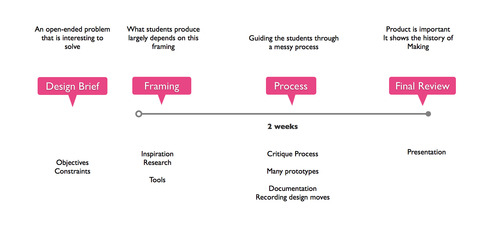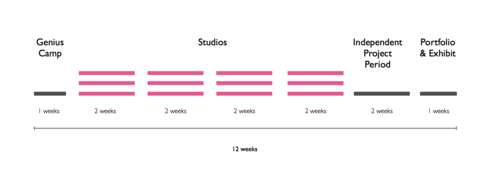Feedback, Transcripts and Evaluations are a vital part of supporting our students' academic growth to communicate student achievement to students, families, secondary schools and colleges.
Feedback
In an effort to better support our students' academic growth and provide constructive feedback, NuVu provides feedback in the form of a skill evaluation at the end of each studio session. This is a vital part of our coaches' responsibilities as they form the fundamental components of the Student Transcript and Written Evaluations.
Feedback is part of a comprehensive transcript and evaluation process to better communicate student achievement to students, families, secondary schools and colleges. Students will have access to feedback on a per studio level and all families will receive a summation of coach comments and skills associated with studios on a per term basis.
Feedback is composed of five part:
- Group Feedback Session in which students and coaches discuss the goals and final products of the studio. This takes place after the student presentations for each studio.
- Written Feedback to students offering coach thoughts on the student's experience.
- Internal Written Feedback to help track student progress. This feedback will not be shared with students.
- Design Skills which reflect grasp of the basic tools for effective ideation, collaboration, design process, self-awareness, documentation and presentation
Design Skills
Design skill are evaluated on anachievement scale per studio and are intended to track progress and give feedback. They appear as description on the transcript and it is assumed that all students engage all design skills in every studio. Design Skills reflect the basic tools for effective ideation, collaboration, design process, self-awareness, documentation and presentation.
The skills are:
- Engagement (Action, Experimentation, Decisiveness)
- Collaboration (Partnership & Leadership)
- Synthesising Critique
- Innovation (creative perspective)
- Iteration (Willingness to refine concepts)
- Critical Thinking (Problem Solving and Analyzing Information)
- Documentation (Reflection & Communication: Effective Oral, Written and Graphical)
- Communication (Intra-team communication, Ability to express ideas effectively to larger audience)
Subject Skills
Subject Skills measure technical achievement based on identified metrics and reflect the skills used in the studio.
The Skills are:
- Electronics Design and Fabrication
- Mechanical Design and Fabrication
- Woodworking
- Metalworking
- Sewing and Pattern Making
- 3D Modelling
- Parametric Modelling
- Drawing/Illustration
- Diagramming
- Programming: Arduino
- Programming: Processing
- Programming: Multimedia (ie MaxMSP)
- Photography
- Film Editing and Production
- Visual Effects
- Sound Engineering
- Music Theory
- Writing: Creative
- Writing: Expository
- Biology
- Chemistry
- Mathematics
- Physics
Transcripts
At the end of each term and their time at NuVu, students will receive a full transcript of all studios in which they participated which clearly indicates studio focus, skills addressed, and contact hours. Transcripts provide a comprehensive overview of a student's NuVu experience.
Transcripts show:
- Student Portfolio Link
- Term Info
- Studio Description
- Project Description
- Contact Hours
- Skills applied within a studio
- Studio Focus
- Methodologies employed in the Studio
Focus Areas
- Fashion
- Critical
- Theory
- Policy
- Storytelling
- Health
- Design for Development
- Multimedia Art
- Music
- Performance
- Ecology
- Technology
- Food
Methodologies
- Animation
- Documentary
- Rapid Prototyping
- Fabrication
- Filmmaking
- Graphic Design
- Photography
- Game Design
- Robotics
- Electronics Design
- Industrial Design
- Mechanical Design
- Architectural Design
- Wearable Design
- Computational Design
- Storytelling
Written Evaluation
Students also receive a comprehensive written evaluation which addresses their overall academic and personal progress, areas of high achievement, and media recognition. This is an opportunity to address design skill progress more fully and communicate a more personal narrative of student experience.
:rotate(0)/4vak3w14u05cp2adek22clelc2ua)
:rotate(0)/p39f1jed4mgd288myquiu5yecweg)
:rotate(0)/t8264scfea4rhtdnbjh5cnazkwiq)

